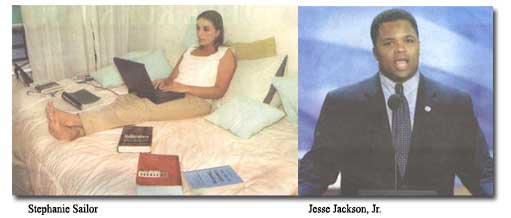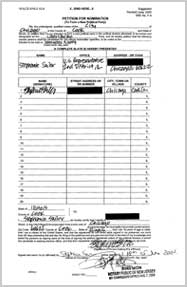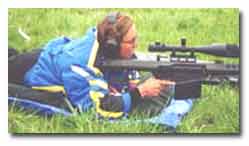C O V E R F E A T U R E
Could a Gun-Loving Libertarian With No Campaign Budget Beat Jesse Jackson Jr.?
Not even if she were a Kennedy. But Stephanie Sailor's not trying to win--she's just trying to get heard.

Author: Jeffrey Felshman Date: October 15, 2004
Appeared in Section 1
Stephanie
Kennedy Sailor is running against Jesse Jackson Jr. for the Second
District congressional seat, but she won't be making any speeches,
shaking any hands, or kissing a single baby. She's running her campaign
almost entirely on the Internet from her home in Fort Lee, New Jersey.
As
she sat at a table in the Milk & Honey Cafe in Wicker Park early
last month, Sailor's scoopneck shirt exposed a fresh surgical scar
below her collarbone, to the right of her neck. Surgery in August for a
condition called thoracic outlet syndrome had left her unable to sit at
a desk for more than an hour without pain. Sailor used to live in the
neighborhood, a few blocks from the cafe, until about three years ago,
when she moved to Jersey. "My legal residence is in Illinois," she
says, but "my primary work is in New Jersey, and all of my doctors are
in New York City." She hasn't set foot in the Second District, which
covers the south side and far-south suburbs, and unless voters there
visit her Web site, www.kennedysailor.com, they probably won't ever see
her name until they get their ballots.
All
of which raises the question of whether Sailor can possibly be serious.
But she insists she is, though "participating in the political system
turns my stomach. I'm just trying with my limited resources to figure
out a way to bypass the traditional system,
in order to get things accomplished," she says.
What
kind of things? At Milk & Honey Sailor leafed through a thick book
with a green cover titled the Cato Handbook for Congress, the
recommendations of the libertarian Cato Institute for the 108th
Congress. If Sailor had her way she'd get government out of health care
and education and dismantle social security. She's highly enthusiastic
about the expiration of the assault weapons ban. If elected she
promises to give back her salary and turn down congressional perks like
a pension and free health care. In fact, she plans to keep her other
jobs as a full-time database administrator and, her health permitting,
as a gun instructor.
Sailor's
also in favor of school choice. She promises to use zero dollars on her
run and asks that any donations be made instead to the Jessica Fund, a
scholarship program she's set up and named after her opponent's
daughter. "Stephanie Kennedy Sailor created The Jessica Fund to help
kids bypass failed government-run schools so they can have access to a
private, competitive education, just like Jessica," her Web site says.
When the election's over Sailor plans to hold an essay contest in which
applicants will explain why they'd like to go to private school, then
distribute any money raised to the winners.
This
isn't Sailor's first run for Congress, but it is her first as a
Kennedy. In 2000 she ran against Luis Gutierrez in the Fourth District
as "Stephanie Sailor" from the Libertarian Party and received 11,476
votes, or 11.3 percent. In 2002, 4,887 voters punched their chads for
"Stephanie vs. the Machine Sailor" in the Ninth District--just 3
percent of the total, but that time she was up against both a Democrat,
Jan Schakowsky, and a Republican, Nicholas Duric. This year she's
changed her nickname to fit the opponent. "The only name that can stand
up against the Jesse Jackson family name is a Kennedy," she says.
She's
also downplaying her party affiliation, leaving it off her Web site
entirely. "It's a marketing strategy," she says. "There's a stereotype,
I think. I've heard people describe Libertarians as nuts,
homeschoolers, freaks, weirdos, frustrated conservatives who want to do
drugs."
 Sailor's
nominating petition contained one signature: her own. She had the
petition notarized, then had a member of the Libertarian Party present
it at the Board of Elections on the last day of filing. The Democratic
Party had a week to challenge it (the specific number of signatures
required for a candidate to get on the ballot is calculated on a
case-by-case basis by election officials, but typically thousands are
required). They didn't. The Democrats were "too smug to check," she
says. Sailor's
nominating petition contained one signature: her own. She had the
petition notarized, then had a member of the Libertarian Party present
it at the Board of Elections on the last day of filing. The Democratic
Party had a week to challenge it (the specific number of signatures
required for a candidate to get on the ballot is calculated on a
case-by-case basis by election officials, but typically thousands are
required). They didn't. The Democrats were "too smug to check," she
says.
The
day we met would be Sailor's last in Chicago for a while. She was due
back in New York to make a doctor's appointment the following day.
Thoracic outlet syndrome is actually a collection of syndromes caused
by the abnormal compression of nerves and arteries in the shoulder. "I
had stopped using a mouse on my right side," Sailor says. "Things like
holding a glass, I would drop it. I was losing my ability to grip." Her
doctors had tried Botox injections to relieve the symptoms, but these
worked only briefly before the pain and numbness came back full
strength. "By the time I decided to have surgery I was in a panic
because it felt like someone was gripping my bicep. I couldn't sleep
anymore," she says. A muscle in Sailor's neck was removed, along with
her top right rib. The NYU surgeon who did the work is one of a handful
in the country who do the surgery.
But
Sailor's problems don't stop there. "I have many medical conditions,"
she says. "I have severe osteoarthritis in both of my feet and a little
bit in my right ankle, my right hip. I also have osteoarthritis in my
lower back and degenerative disk disease." These aren't helped by her
asthma, the torn ligaments in her right hip, or other tears in her hip
socket. "It's painful for me to walk even a block," she says. "I feel
like an 80-year-old in a 31-year-old body." She visits doctors at least
every other week, and has plans for more surgeries down the road.
Sailor's
father was in the navy, and when she was growing up her family moved
several times, with stops in Connecticut, Idaho, Indiana, Maine,
upstate New York, and Michigan, all before she'd turned 18. She started
babysitting at age 9, was a line cook in a restaurant owned by a
friend's parents at 12, and worked various restaurant jobs on summer
vacations before enrolling at Eastern Michigan University to study fine
arts. She thinks some of her physical problems might be related to
childhood labor: "If I could do things over I would have skipped the
restaurant work because it was hard on my body. I would finish working
my shifts and I could barely walk."
In
school in Idaho City, Idaho, Sailor's class of 40 students always ran
short of paper and pencils, while in Bridgeman, Michigan, classrooms
were carpeted and equipped with a TV and a VCR. "When I moved around
and attended different schools I was exposed to how government schools
are dependent on property taxes," she says. "It's not equal and some
kids really get left behind because they're not allowed a choice." She
would fix that by turning all public schools into private schools and
giving parents a standard allotment to pay for them--not exactly small
government, it must be said.
As
a newlywed new to Chicago in 1996, Sailor caught pneumonia and went to
the emergency room at Cook County Hospital. Despite complications
caused by her asthma, she says, she waited eight hours for medical
attention. After "the most horrible medical experience in my life" she
looked for options to public hospitals and found many private hospitals
had charity funds available. Charity in a private setting was better
than mismanaged care in a public one, she decided. "My medical ailments
helped me form the beliefs about not having government in my health
care," she says.
Ultimately,
however, it was crime that propelled Sailor into politics. After
personally experiencing two break-ins and an assault by rock-throwing
kids and hearing the stories of friends who'd been robbed at gunpoint,
she decided to
explore self-defense options, including firearms, despite Chicago's
weapons ban.
 Sailor
didn't know much about the Libertarian Party when she signed up for a
free course in gun safety hosted by John Birch from the pro-gun
organization Concealed Carry and Matt Beauchamp, then the chair of the
Libertarian Party of Chicago, at a shooting range in Elmhurst. But she
wound up on the party's mailing list as a result. In the year following
her first course, in the summer of 1999, Sailor got divorced, hosted a
cable-access show called Guns, Drugs, and Chicks, and spoke at a
gun-rights conference in Arlington, Virginia. Since then she's become a
regular at the Boomershoot, an annual event in Idaho where gun nuts
shoot at targets wired with explosives. "It's very satisfying, like
combining fireworks with guns," she says. "Fun!" Sailor
didn't know much about the Libertarian Party when she signed up for a
free course in gun safety hosted by John Birch from the pro-gun
organization Concealed Carry and Matt Beauchamp, then the chair of the
Libertarian Party of Chicago, at a shooting range in Elmhurst. But she
wound up on the party's mailing list as a result. In the year following
her first course, in the summer of 1999, Sailor got divorced, hosted a
cable-access show called Guns, Drugs, and Chicks, and spoke at a
gun-rights conference in Arlington, Virginia. Since then she's become a
regular at the Boomershoot, an annual event in Idaho where gun nuts
shoot at targets wired with explosives. "It's very satisfying, like
combining fireworks with guns," she says. "Fun!"
Sailor
didn't join the NRA, but the mailings from the Libertarian Party did
what they were meant to do. "I started to read up on libertarianism and
I became involved on a sort of activist level with the Libertarian
Party of Chicago," she says. In 2000 the party asked her to come to its
aid by running for Congress. "They'd try to run people in districts
where the incumbent was running unchallenged. So it was a kind of easy
way to get on the ballot." She was told that she wouldn't have to do
anything, just get signatures on the nominating petition and let the
party do the rest. "I said, wait a minute, I don't have to do anything,
I don't have to pay any money, I don't have to shake hands? I really
didn't have the money and I didn't have the time, either. They said,
'Yeah, we need candidates to run.' So I said OK," she says.
She's
been running ever since. "I'm getting better with each campaign,
learning new strategies," she says. "And because the Internet has
become more accessible that gives me more power."
Sailor
estimates that five times as many people have Web access today as did
then. At the same time, she admits she doesn't know how many Second
District constituents are wired. Nor will she stand on street corners
to find out. "I physically could not go out and stand for hours," she
says. "I can't do it."
Sailor
is willing to do some campaigning outside her bedroom. She's e-mailed
Jesse Jackson Jr. dozens of times since August asking for a debate. (He
hasn't answered.) She'll appear on public television's candidate forums
if invited. (She hasn't been.) But she's happy enough to put up a Web
site and see what sticks. "I like the cyber campaigning because even
after the election the site stays up, and it's still a tool to educate
the masses," she says. And though she gets little or no response from
voters until Election Day, Sailor professes to like it that way: "It's
funny, because
I wonder, gee, what's going to happen this time."
Photos/Charles
Eshelman, AP/Wide World Photos and Boomershoot.com.
Back
to KennedySailor.com News Coverage Page
| |



 Sailor's
nominating petition contained one signature: her own. She had the
petition notarized, then had a member of the Libertarian Party present
it at the Board of Elections on the last day of filing. The Democratic
Party had a week to challenge it (the specific number of signatures
required for a candidate to get on the ballot is calculated on a
case-by-case basis by election officials, but typically thousands are
required). They didn't. The Democrats were "too smug to check," she
says.
Sailor's
nominating petition contained one signature: her own. She had the
petition notarized, then had a member of the Libertarian Party present
it at the Board of Elections on the last day of filing. The Democratic
Party had a week to challenge it (the specific number of signatures
required for a candidate to get on the ballot is calculated on a
case-by-case basis by election officials, but typically thousands are
required). They didn't. The Democrats were "too smug to check," she
says.  Sailor
didn't know much about the Libertarian Party when she signed up for a
free course in gun safety hosted by John Birch from the pro-gun
organization Concealed Carry and Matt Beauchamp, then the chair of the
Libertarian Party of Chicago, at a shooting range in Elmhurst. But she
wound up on the party's mailing list as a result. In the year following
her first course, in the summer of 1999, Sailor got divorced, hosted a
cable-access show called Guns, Drugs, and Chicks, and spoke at a
gun-rights conference in Arlington, Virginia. Since then she's become a
regular at the Boomershoot, an annual event in Idaho where gun nuts
shoot at targets wired with explosives. "It's very satisfying, like
combining fireworks with guns," she says. "Fun!"
Sailor
didn't know much about the Libertarian Party when she signed up for a
free course in gun safety hosted by John Birch from the pro-gun
organization Concealed Carry and Matt Beauchamp, then the chair of the
Libertarian Party of Chicago, at a shooting range in Elmhurst. But she
wound up on the party's mailing list as a result. In the year following
her first course, in the summer of 1999, Sailor got divorced, hosted a
cable-access show called Guns, Drugs, and Chicks, and spoke at a
gun-rights conference in Arlington, Virginia. Since then she's become a
regular at the Boomershoot, an annual event in Idaho where gun nuts
shoot at targets wired with explosives. "It's very satisfying, like
combining fireworks with guns," she says. "Fun!"